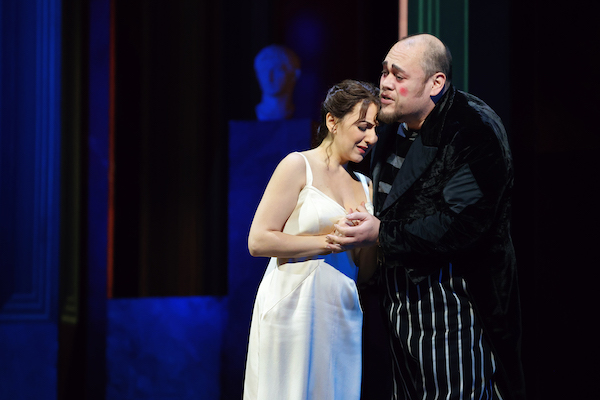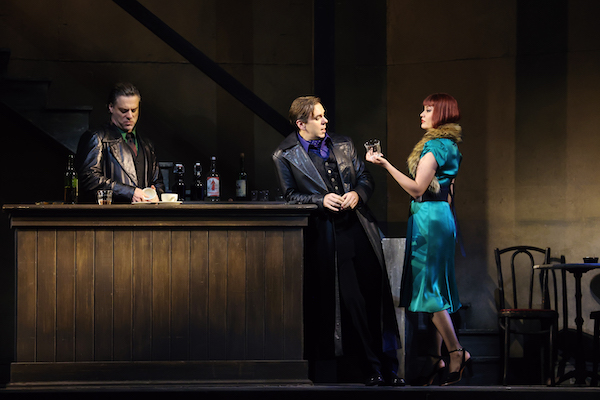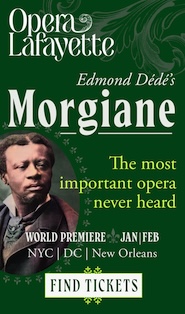Two impressive Met debuts join Kelsey’s star turn in “Rigoletto”

Bartlett Sher’s production of Verdi’s Rigoletto returned to the Metropolitan Opera on Wednesday with Quinn Kelsey in the title role. His acclaimed performance is draw enough but the debuts of conductor Speranza Scappucci and tenor Benjamin Bernheim were also especially noteworthy.
The tragic tale of the licentious Duke of Mantua and Rigoletto, his hunchbacked court jester, centers on the latter’s innocent daughter, Gilda. At its core, it is a story of a complex relationship between father and daughter, who sacrifices her life for that of the Duke whom she loves. Rigoletto’s tongue, which is as sharp as the assassin Sparafucile’s knife, is his downfall. The curse hurled at Rigoletto by an angry courtier comes true as the opera ends with him cradling the body of his dead daughter.
Efficiency is the chief virtue of Sher’s concept for Rigoletto. A rotating unit set houses the four scenes of the opera. The Duke’s palace is massive, monumental, and cold. Rigoletto’s home and Sparafucile’s inn, in contrast are plain, but equally cheerless. Class distinctions are made clear through military uniforms and jewel-toned gowns for the Duke’s court versus streetwear for everyone else. Long, black leather coats for the men, however, cut across class lines.
Apart from updating the action, Sher sticks mostly to the book, which makes his deviations from it in Act III all the more baffling. With a storm raging, Gilda is inside Sparafucile’s tavern, which is awash in an eerie red light, long before she knocks on its door. It is sort of a muddle, with Sher inexplicably sending the action into the Twilight Zone for a few minutes.
Scappucci’s appearance on the podium prompted an outpouring of applause. The Italian-born conductor is no stranger to New York, having attended the Juilliard School and working at both the New York City Opera and the Met earlier in her career. She served as Riccardo Muti’s assistant at the Salzburg Festival for eight years and in 2022 became the first woman to conduct at La Scala Milan. Since 2017, she has been the music director at the Royal Opéra de Wallonie in Liège.
Scappucci favored brisk tempos. The opening scene of the opera, including the Duke’s aria, “Questa o quella”, sparkled with excitement and energy. Rigoletto’s initial outburst in “Cortigiani, vil razza dannata” shot like a flash of lightning from both singer and orchestra. Such intensity, however, yielded to a delicacy and transparency that accompanied Gilda’s outpouring of love for the Duke, as well as in her heartbreaking duets with her father.
The Met Orchestra embraced Scappucci and played brilliantly for her. This was equal parts auspicious debut and heartfelt homecoming for the conductor.
Bernheim, who began his career as a young artist at the Zurich Opera, has sung in Europe’s leading opera houses, including the Opéra national de Paris, Wiener Staatsoper, Staatsoper Berlin, Teatro alla Scala, and the Royal Opera House in London. He’s not a tenor that tears up the stage as an actor; it’s all about the voice. Few tenors posses such a beautiful instrument, let alone have such a free, open sound, which soared effortlessly into the house.

Verdi wrote some of his best, and surely, most popular arias for the Duke and Bernheim sang them splendidly. He tossed off “Questa o quella” with abandon, as he boasted of his sexual conquests. In “La donna è mobile”, Bernheim sang of the fickleness of women with the vocal glamour and thrilling high notes that are his to command.
Kelsey again triumphed as Rigoletto. In the intervening months, the baritone has refined his interpretation both vocally and dramatically. The subtlety of his acting is now equalled by the refinement of his singing. Kelsey is absolutely at ease in the role and makes it his own.
Rosa Feola reprised the role of Gilda, which she too sang in the production’s premiere. The loveliness of her voice and person make her an ideal Gilda. For all of the exquisite artistry that she brings to “Caro nome,” however, it was her singing in the duets with Kelsey’s Rigoletto and Bernheim’s Duke that made for the most memorable moments of this performance.
With his cavernous voice, John Relyea’s Sparafucile was cold, calculated and chilling. Aigul Akhmetshina made her Met debut as Maddalena, proving sexy and defiant in the role, which afforded only a tease of her alluring mezzo-soprano. As commanding in stature as voice, bass-baritone Bradley Garvin was a standout as Monterone, the count who hurled the fatal curse at Rigoletto.
Rigoletto runs through December 29. Luca Salsi and Michael Chioldi, Lisette Oropesa, and Stephen Costello take the principal roles in December. metopera.org





